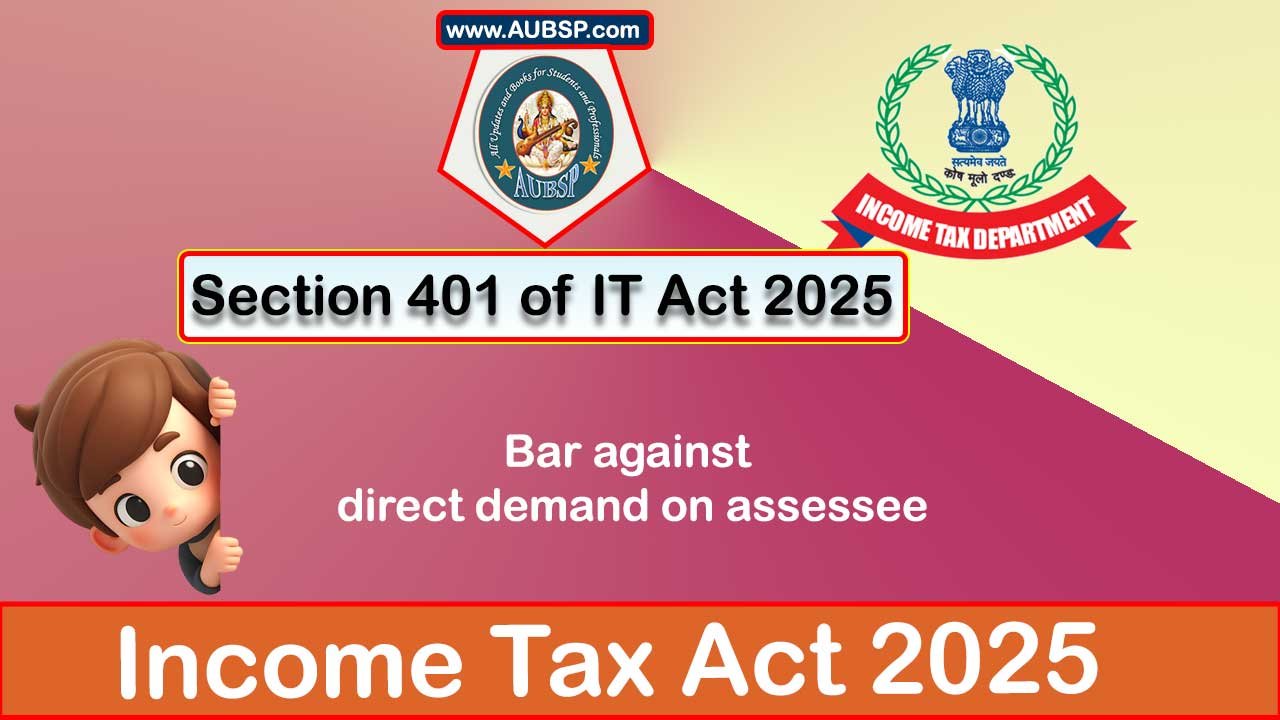Bar against direct demand on assessee
[Section-401 as per the Income Tax Act, 2025 (this Act) w.e.f. 1st April, 2026.]
Where tax is deductible at the source under this Chapter, the assessee shall not be called upon to pay the tax himself to the extent to which tax has been deducted from that income.
FAQs on Section 401 of Income Tax Act 2025
What does Section 401 of the Income Tax Act, 2025 provide?
Section 401 states that where tax is deductible at source under the relevant chapter, the assessee shall not be called upon to pay the tax himself to the extent that tax has already been deducted from that income.
Does Section 401 completely exempt the assessee from tax liability?
No, it exempts the assessee only to the extent that tax has actually been deducted at source. If no or partial TDS has been made, the balance liability may still exist.
If tax has been deducted at source but not deposited to the government, can the assessee still be held liable?
No, Section 401 bars any direct demand from the assessee for the portion of tax that has been deducted from the income, regardless of whether it has been deposited.
Is the assessee required to verify whether the deductor deposited the tax to the government?
No, the assessee’s liability ends once the tax is deducted. Responsibility for deposit lies with the deductor.
Does this bar apply to all types of income where TDS is applicable?
Yes, it applies broadly to all incomes covered under the chapter where tax is deductible at source.
Can the Assessing Officer still issue a demand notice if TDS has already been deducted?
No, Section 401 prohibits issuance of a direct demand notice to the assessee for the tax amount already deducted.
How can an assessee prove that tax has been deducted from their income?
The assessee can refer to the TDS certificate (Form 16/16A) or their tax credit statement (Form 26AS) as evidence of deduction.
Does Section 401 apply in case of non-residents as well?
Yes, if tax is deductible at source from payments to non-residents, this provision equally applies to them.
What happens if the deductor fails to deduct TDS?
In that case, the assessee may still be held liable for the tax on such income since no deduction occurred.
Does this section protect the assessee during reassessment or rectification proceedings too?
Yes, the bar against direct demand applies regardless of the stage of assessment, as long as tax has been deducted.
Is the assessee protected under Section 401 in case of litigation or appellate proceedings?
Yes, as long as the income in question has suffered tax deduction at source, the assessee cannot be asked to pay again.
Does this section eliminate the need for the assessee to file a return?
No, Section 401 does not affect the filing requirement. The assessee must still file a return if required under other provisions.
Can recovery proceedings be initiated against the assessee for deducted tax?
No, recovery proceedings cannot be initiated against the assessee for any portion of income where tax has already been deducted at source.
Is Section 401 applicable to advance tax or self-assessment tax?
No, it applies only where tax is deductible at source, not to advance tax or self-assessment tax.
If the assessee has received net income after TDS, can the department still pursue recovery for gross tax?
No, to the extent tax has been deducted from the income, the department cannot pursue the assessee directly under Section 401.

